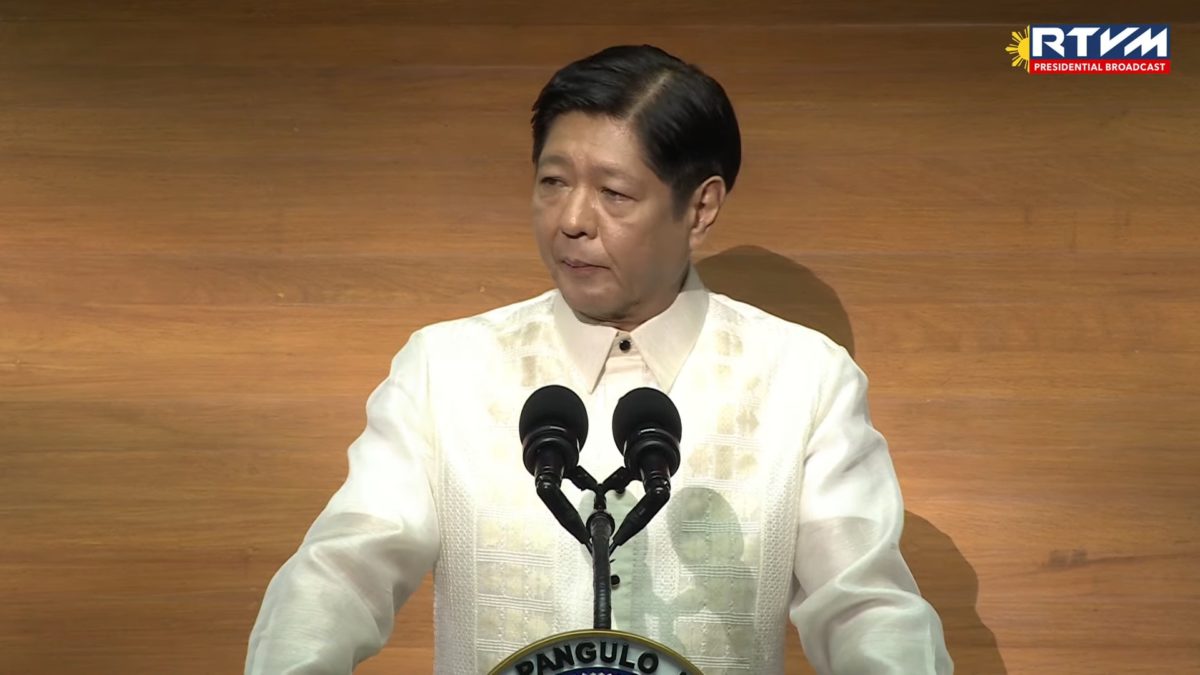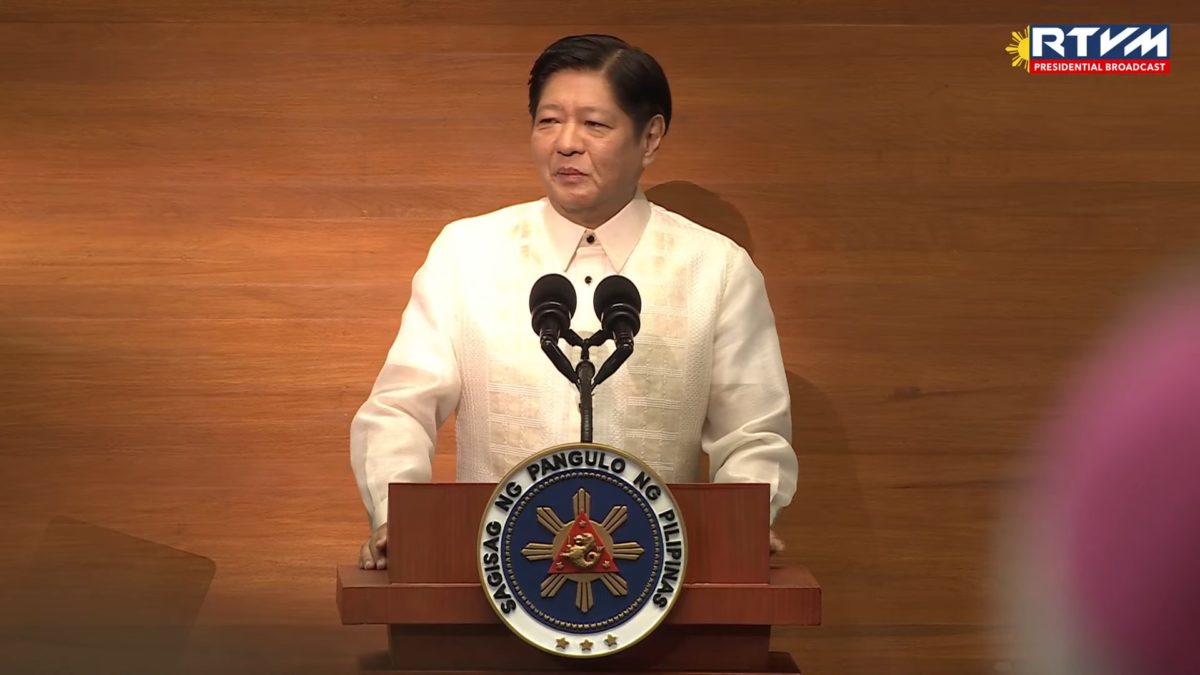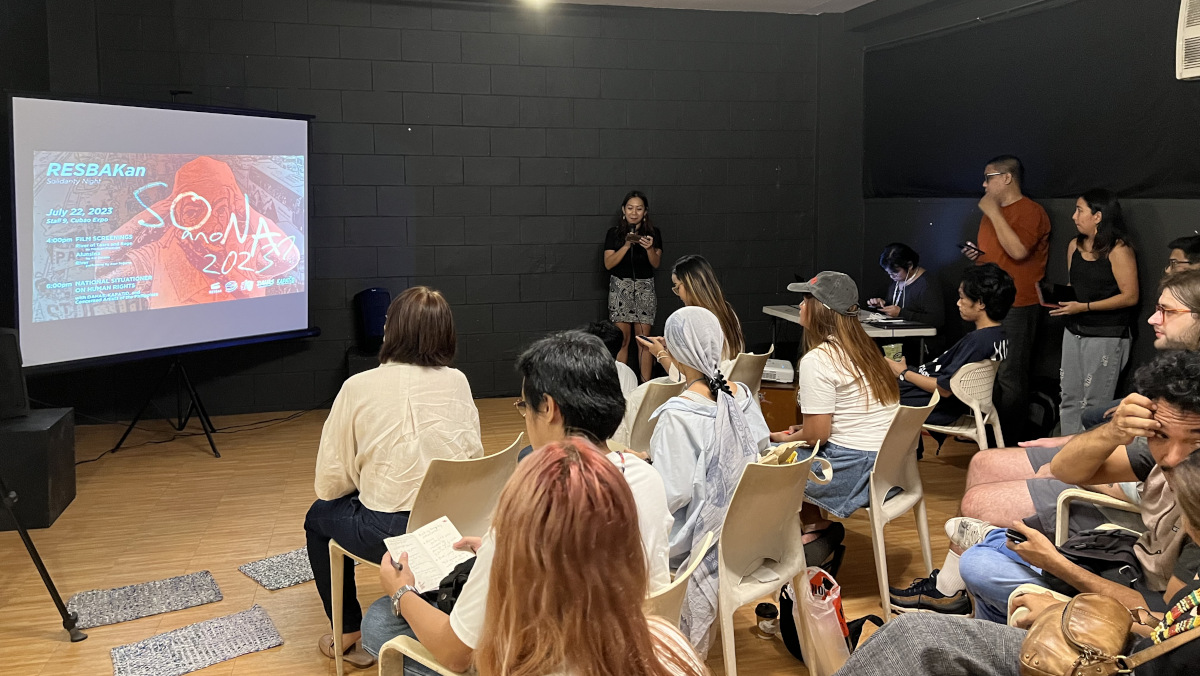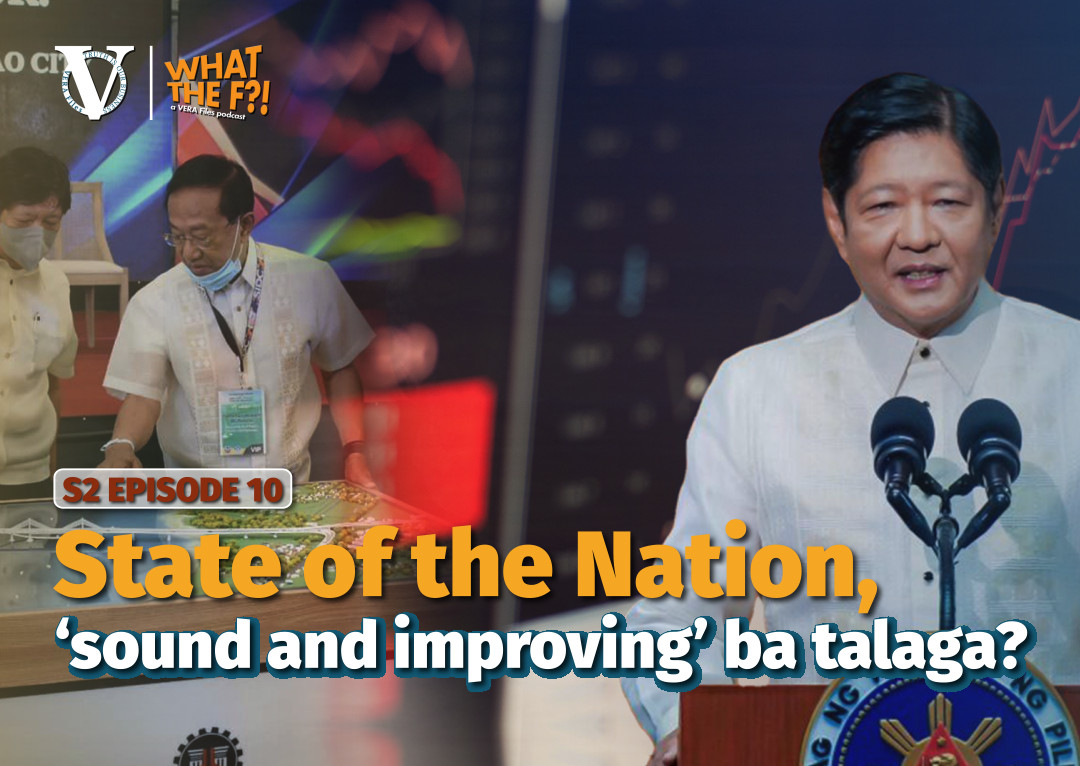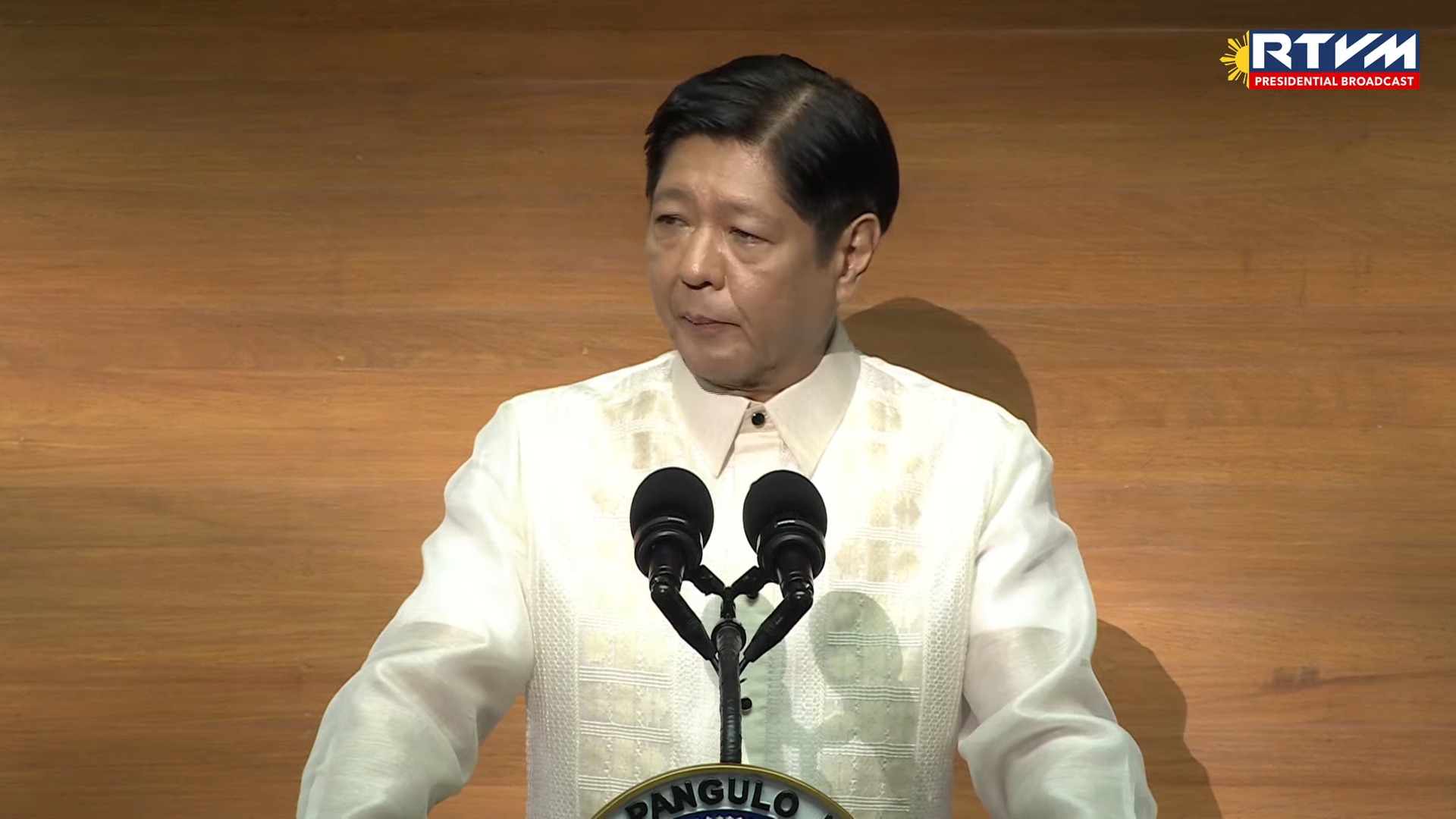
Declaring that the current state of the nation is “sound and improving,” President Ferdinand Marcos Jr. put forward his favorite topics on economic growth, infrastructure, agriculture, health and climate change, as he did so in his previous State of the Nation Address (SONA).
His priority measures include taxes on single-use plastics, digital services, and motor vehicle user’s charge; the military and uniformed personnel pension; amendments to the Fisheries Code, Cooperative Code and Government Procurement Reform Law.
(Read Marcos lays down plans, skips key issues in first SONA)
But absent in Marcos’ second SONA are controversial issues such as the South China Sea dispute and human rights abuses.
“On matters of the economy, there are many things over which we have no control. But over those that we do have control, we are doing everything we can,” he said, boasting that the Philippines is “among the fastest-growing economies” in Asia and in the world.
Still sitting as Agriculture secretary, Marcos emphasized the role of Kadiwa stores in bringing down prices of agricultural products by connecting farmers and buyers.
Blaming smugglers, hoarders and price manipulators for the shortage and high prices of agricultural products such as sugar, onion and salt during his maiden year, Marcos warned that their days are numbered.
The president renewed his policy in favor of community-based treatment, rehabilitation, education and integration in curbing the drug problem. However, he did not mention the pending investigation of the International Criminal Court on former president Rodrigo Duterte’s war on illegal drugs and the killings that went with it.
Marcos said “unscrupulous law enforcers and others involved in the highly nefarious drug trade have been exposed,” apparently referring to around 50 police officers involved in a P6.7-billion shabu haul “cover up.”
“In their stead, we will install individuals with unquestionable integrity, and who will be effective and trustworthy in handling the task of eliminating this dreaded and corrosive social curse. We cannot tolerate corruption or incompetence in government,” he added.
Read more about each specific sector below:
On infrastructure
The administration aims to sustain infrastructure spending at 5% to 6% of GDP, or from P1.3 to P2.3 trillion, every year. Under the Build Better More program, there are 194 high-impact Infrastructure Flagship Projects (IFPs) worth P8.3 trillion. One hundred twenty-three of these were initiatives of the Marcos administration, while the rest were carried over from the previous administration.
More than 4,000 kilometers of roads and around 500 bridges were constructed, maintained and upgraded as of June. Marcos mentioned the completion of airport and port development projects such as Cebu’s Pier 88 Smart Port and the passenger terminal buildings of Clark Airport and the Port of Calapan. Ongoing infrastructure projects include the Luzon Spine Expressway Networks Program that will link Ilocos to Bicol, the 90-km inter-island Mega-Bridge Program, and the Southern leg of the North-South Commuter Railway System that will reduce travel time from Pampanga to Laguna from four to just two hours.
Marcos again highlighted how the newly-established Maharlika Investment Fund is expected to finance the infrastructure program.
On foreign relations
Marcos claimed that his “friend to all, enemy to none” strategy has proven effective. He vowed to protect the country’s national interest through constant dialogue and diplomatic approaches with other countries.
He boasted that his 13 foreign trips to 10 countries have so far yielded total investment (pledges) of US$71 billion or P3.9 trillion, with the potential to generate 175,000 jobs. The total approved investment projects have reached P1.2 trillion in his first 12 months, while other strategic investments through the so-called “green lanes” amounted to P230 billion.
Aside from the existing bilateral and multilateral agreements with the Association of Southeast Asian Nations, Japan and Europe, Marcos vowed to forge more international partnerships. He mentioned the country’s membership in the Regional Comprehensive Economic Partnership (RCEP), which took effect last June.
On drugs and crime
Although the anti-drug campaign continues in busting syndicates, Marcos said it is now geared towards community-based treatment, rehabilitation, education, and reintegration to curb drug dependence of affected Filipinos.
Marcos said he will be accepting the resignation of law enforcers who had been exposed for their involvement in the illegal drug trade.
The Marcos administration fully supports the efforts of the judiciary to improve the justice system and protect the constitutional rights of the people. He said the police and the military are being modernized to be more effective in maintaining peace and order and in defending the country’s sovereignty.
On the economy
Marcos highlighted a “revived and rejuvenated” economy, stating “improved” figures in inflation, investments and revenue collection in his first year as president. He said the country posted a 6.4% growth in gross domestic product in the first quarter of 2023 but failed to mention that it was the lowest after seven quarters since 2021, based on data from the Philippine Statistics Authority.
The president allayed concerns over the controversial and recently-approved Maharlika Investment Fund. He assured that “a group of internationally recognized economic managers” will abide by principles of transparency and accountability.
Among the priority measures related to the economy, Marcos called on Congress to pass laws taxing single-use plastics, digital services and road use. He also received applause for his calls for a new government procurement law and government auditing code.
On education
Marcos expounded on his vision for the education sector, vowing to focus on learning recovery in the basic education level, following a World Bank study in 2022 that showed that the country’s learning poverty hit 90.9%. This meant that school children, aged 10, are “unable to read and understand age-appropriate text.”
The president also highlighted the need to focus on skills-based learning, urging the increase in literacy and numeracy skills at the basic education level. Marcos also lauded DepEd’s new program that encourages partnership with the private sector to capacitate schools in the country. He also bragged that over a million Filipinos finished technical-vocational education and training at the end of 2022.
On basic services
The government’s hunger alleviation initiative dubbed Walang Gutom 2027: Food Stamp Program started its pilot stage this month in select areas of the country. It will benefit more than 3,000 low-income families identified by the Department of Social Welfare and Development.
Marcos also said the Pag-IBIG Fund granted housing loans to more than 100,000 Filipinos amounting to P117.85 billion this year which, he said, is a record-high in the agency’s history. The president further promised to provide more accessible housing through the recently launched Pambansang Pabahay Para sa Pilipino Housing Program or the 4PH.
On energy
Marcos envisions full electrification in households by the end of his term while keeping mum about the looming power crisis. For this reason, he reiterated the country’s goal to beef up renewable energy sources in the Philippine power mix by 2040. In doing so, the Department of Energy reported over 1,000 renewable energy (RE) projects ongoing as of March 2023. Hydroelectric power generation projects take the lion’s share of this effort, with 435 RE projects.
The president also vowed to push for oil and gas exploration in other parts of the country, taking away the spotlight on Malampaya’s depleting resources and looking toward the Bangsamoro Autonomous Region in Muslim Mindanao for new exploration efforts.
On the environment
Marcos reiterated his administration’s commitment to integrate climate change into the government’s policies and plans. He did not cite concrete plans on how to mitigate its impact on the agriculture sector. A study shows that climate change reduced agricultural productivity globally by 21% in 2021.
On corruption and good governance
Following his directive to the National Bureau of Investigation and Department of Justice to start a probe into agricultural smuggling, Marcos warned that the days of agricultural smugglers and hoarders are numbered. He also said he will replace corrupt law enforcement officials involved in illegal drugs with “individuals with unquestionable loyalty” who will be trustworthy enough in finally ending the illegal drug trade.
On agriculture
Marcos flaunted the Kadiwa program for providing cheap agricultural products and promised to expand the program nationwide. However, while Kadiwa stores sold relatively cheaper goods, consumers still felt the effects of the high inflation rate in the first quarter of the year in terms of utility, housing and food expenses.
Discussing the welfare of fisherfolks and farmers, he called for the revision of the Fisheries Code and highlighted as part of his administration’s achievements the signing into law of the new Agrarian Emancipation Act and the government’s continuing efforts to modernize production and provide biofertilizers and other inputs to farmers.
On AFP modernization and the peace agenda
Marcos assured the country’s military and uniformed personnel (MUP) that they will not feel the effects of the transition from the old pension system to a new one. This is in light of the progress in proposals to reform the MUP’s pension system, which seek to make contributions mandatory for new and active personnel. (See VERA FILES FACT SHEET: Top concerns of military, other uniformed personnel on the Marcos admin’s pension reform proposal)
This affirms Defense Secretary Gilbert Teodoro’s statement earlier in the day that the transition from a non-contributory pension system to a contributory one for MUPs “shall be phased and not implemented in one go” — a consensus reached after close consultation with key stakeholders.
On labor, OFWs
Marcos once again highlighted in his SONA the role of overseas Filipino workers (OFWs) in boosting the country’s economy, showcasing the government’s efforts to improve their welfare and to address recruitment and deployment issues.
He still did not mention plans to increase wages and end contractualization but vowed to generate additional jobs and better employment opportunities for Filipinos.
On health and COVID-19 response
Marcos got loud applause and cheers from the audience when he declared that both private and public healthcare workers will finally receive their COVID-19 health emergency allowance “and other pending benefits.” However, he did not specify when this would start.
He also highlighted the “increase both in number and in capability” of health facilities and specialty centers in the country. He added that the government is addressing the country’s shortage of healthcare professionals by putting in place educational reforms and ensuring the welfare of the health workforce.
Other healthcare projects mentioned by Marcos in his address include establishing “ample testing sites” for early diagnosis and treatment of tuberculosis and HIV/AIDS, lowering prices of basic medicines, and developing a “better and more efficient PhilHealth.”
Three days before his SONA, the president lifted the state of public health emergency which had been in place over the entire country for over three years because of the COVID-19 pandemic.
– with contributions from Blanch Marie Ancla, Merinette Retona, Rhoanne De Guzman, Celine Samson, Elma Sandoval, Bryan Manalang, Valerie Nuval, Ivel Santos, Enrico Berdos, Ellen Tordesillas, Chi Liquicia, Tita Valderama, Mon Caling, Arabella Asis, John Irving Gandia, Kiara Ysabel Gorrospe, Charmaine Deogracias, Sarah Tomas
